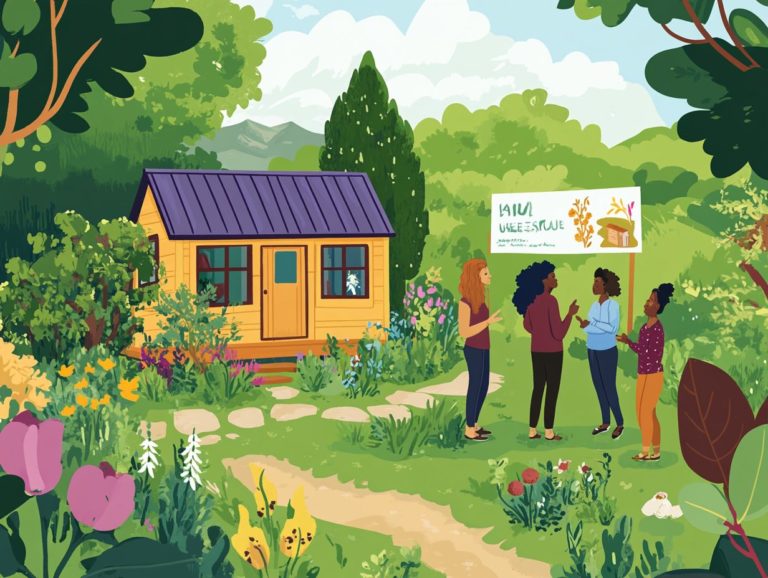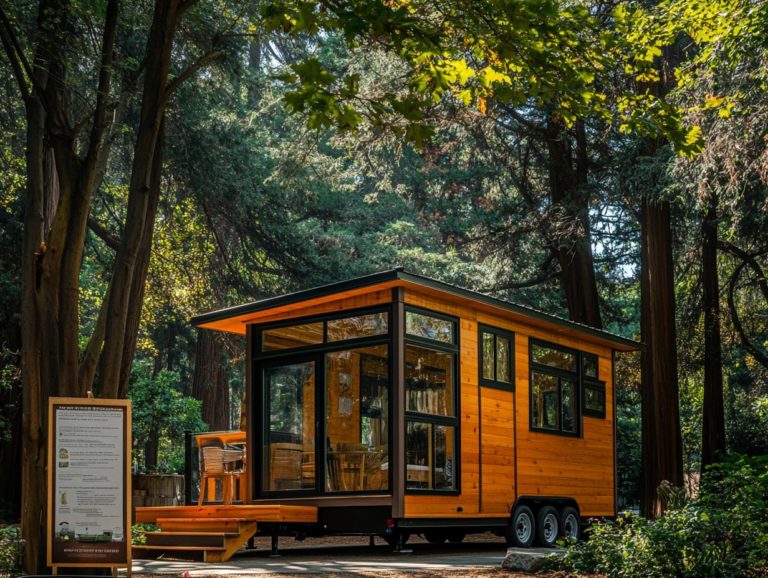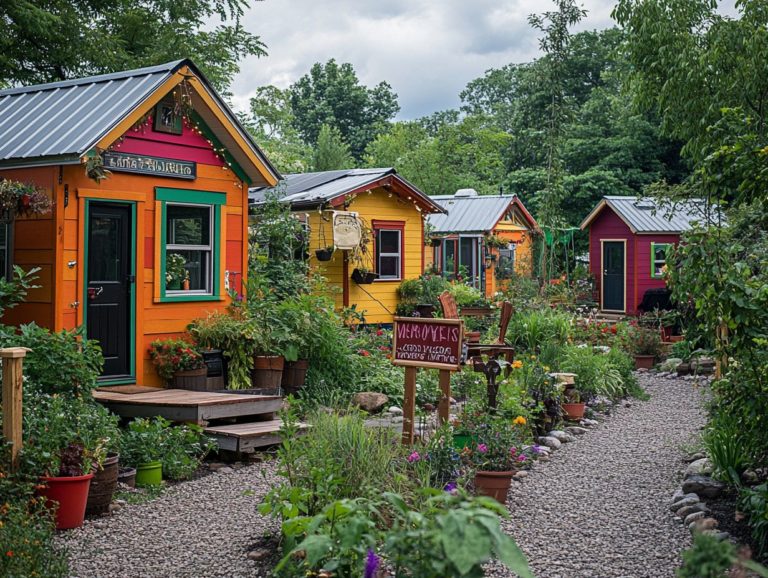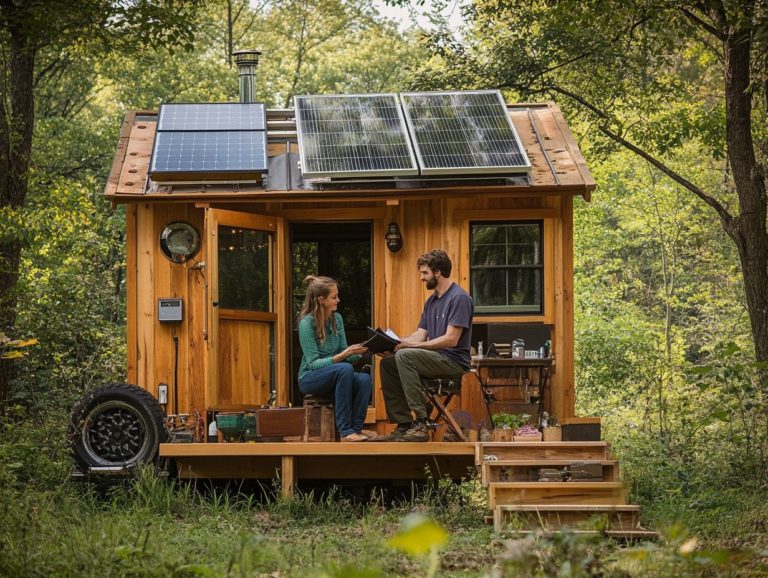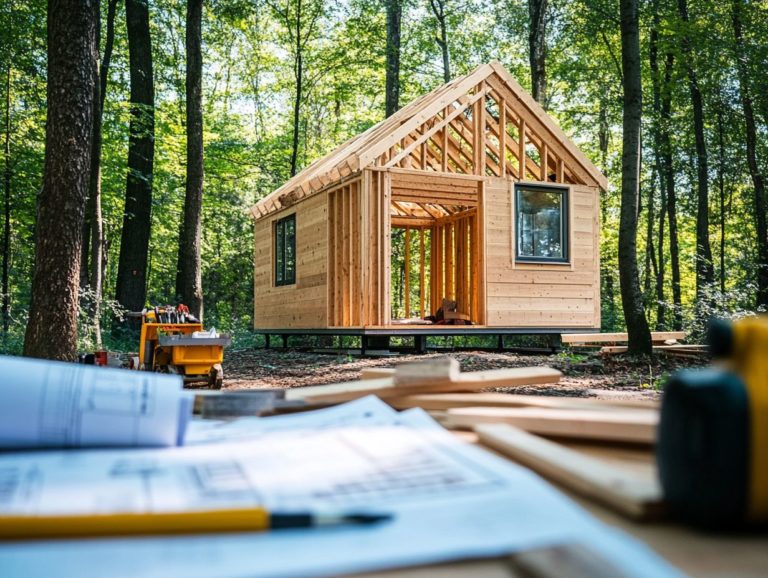Tiny House Parking: Legal Guidelines
As the tiny house movement gathers momentum, recognizing where to park these compact living spaces becomes crucial for you.
This article delves into the details of tiny house parking, covering various definitions, parking options, and the legal considerations you should be aware of.
You ll find a comprehensive breakdown of zoning laws, permits, and regulations that could influence your tiny home journey.
You ll also uncover practical tips for locating suitable spots, whether you re renting land or considering alternatives like RV parks and campgrounds.
Let s dive into everything you need to know to make your tiny house dreams come true!
Contents [hide]
- Key Takeaways:
- Why Tiny House Parking Matters
- Legal Considerations for Tiny House Parking
- Finding a Suitable Parking Spot
- Alternative Parking Options for Tiny Houses
- Frequently Asked Questions
- Is it legal to park a tiny house on any property?
- What are the legal guidelines for parking a tiny house on private property?
- Can I park my tiny house on public land?
- What are the legal requirements for parking a tiny house on wheels?
- Are there any restrictions on where I can park my tiny house?
- What happens if I park my tiny house illegally?
Key Takeaways:
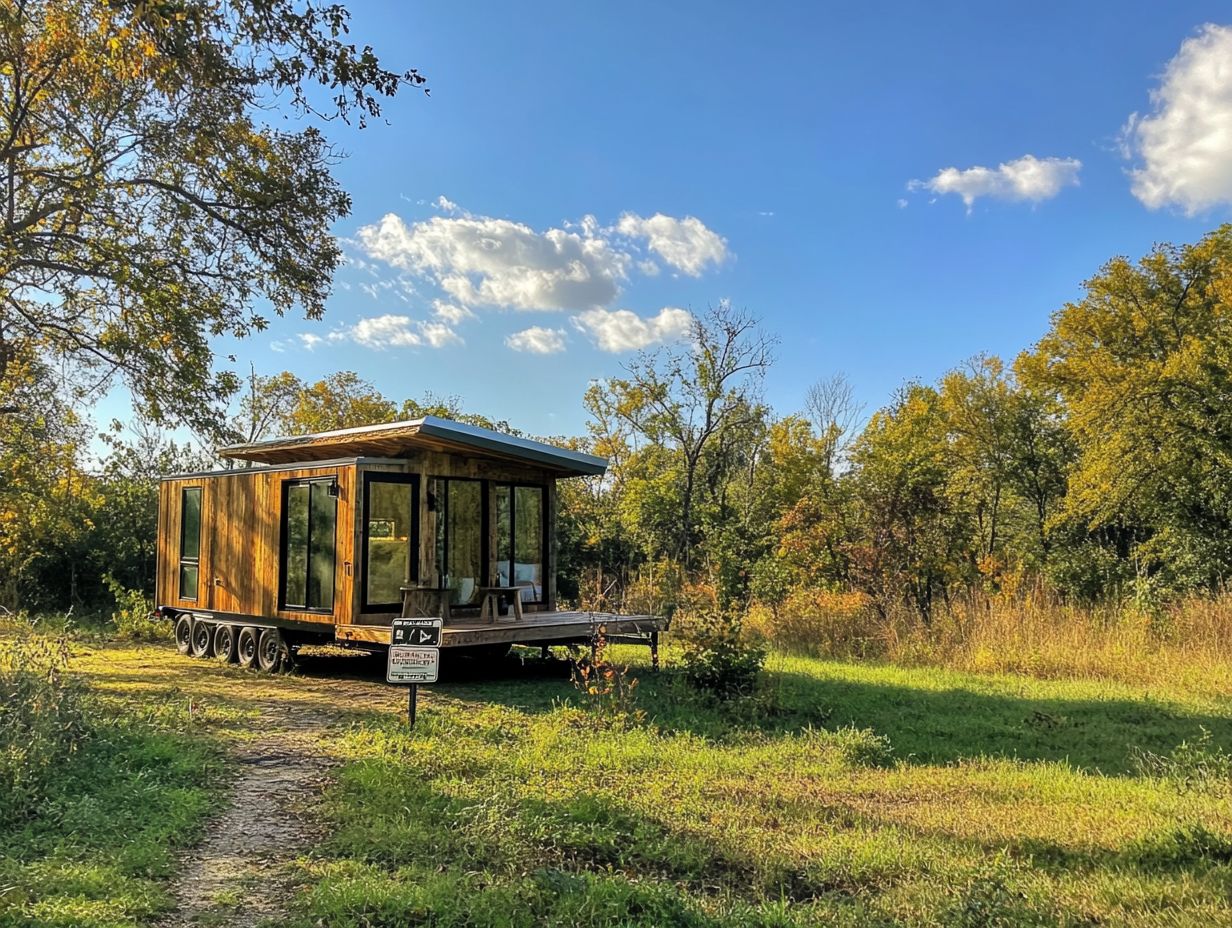
- Before parking a tiny house, it is important to understand local zoning laws and building codes to ensure legal compliance.
- Factors such as affordability, convenience, and accessibility should be considered when searching for a suitable parking spot for a tiny house.
- Alternative parking options such as RV parks and campgrounds can provide a legal and affordable solution for parking a tiny house.
Why Tiny House Parking Matters
Understanding Tiny House Parking is essential for prospective owners, particularly in regions like Massachusetts, where local regulations and zoning laws can greatly influence your parking options.
Tiny houses, generally under 400 square feet, present innovative housing solutions. Yet, they come with a set of legal considerations, including building codes and parking requirements.
As the popularity of mobile homes and small homes added to existing properties continues to rise, mastering the details of tiny house parking will empower you to secure a fitting location while staying compliant with local regulations.
Defining Tiny House and Parking Options
Defining tiny houses and their parking options is crucial for prospective owners, especially if you’re looking to maximize your living space while adhering to the regulations tied to the tiny house movement.
Understanding the details of these compact homes empowers you to make informed choices about your lifestyle and investments.
For many, tiny houses represent a departure from traditional living, embracing minimalism and sustainability in a modern context.
The location of your tiny house can significantly influence your experience. Options range from private land to RV parks, and even community setups tailored for tiny dwellers, including Tiny House Communities in places like Nantucket and Berkshire County.
These diverse choices cater to your individual preferences and shape your overall living experience. The rise of mobile homes in this landscape offers a flexible alternative, appealing to those who cherish the freedom to relocate while enjoying a cozy, self-sufficient space.
Legal Considerations for Tiny House Parking
Navigating the legal considerations for tiny house parking is crucial for you as an aspiring homeowner, especially in Massachusetts. Here, municipalities enforce specific zoning laws and building codes that determine where tiny houses can be placed.
Grasping these regulations is essential, as it not only ensures your compliance but also offers valuable insights into potential property taxes and other legal obligations tied to tiny house living.
Ready to find the perfect spot for your tiny house? Start exploring your options today!
Zoning Laws and Building Codes
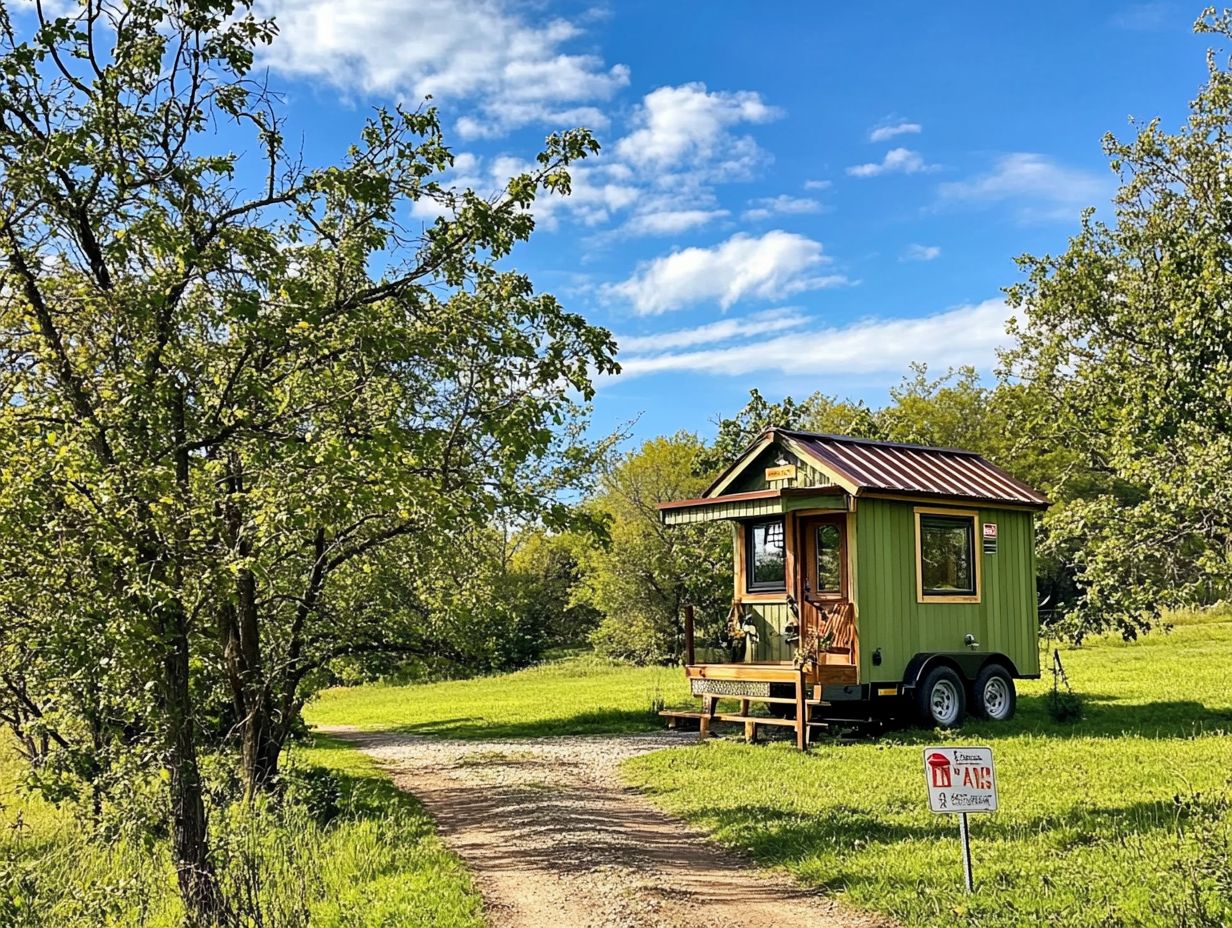
Zoning laws and building codes are critical legal considerations that determine whether you can park tiny houses in various municipalities. In Massachusetts, regulations can differ dramatically.
To fully grasp these regulations, explore the different types of zoning residential, commercial, and agricultural. Each type presents its own unique challenges and opportunities. For example, some areas may adopt a more flexible approach, making tiny home living easier, while others might enforce strict size and architectural standards.
These regulations greatly affect tiny house owners and your options for legal parking. The quest for local authority approvals can slow your progress, yet understanding tiny house zoning laws can also open doors for advocacy and community support, fostering greater acceptance of tiny living solutions.
Permitting and Regulations
Are you ready to navigate the permitting process? Obtaining the necessary permits and understanding the regulations surrounding tiny house parking are crucial steps for anyone looking to establish a legal living space in Massachusetts or any other state, especially regarding recreational vehicles or mobile homes.
This journey involves navigating confusing rules of local ordinances, zoning rules, and building codes. These can vary significantly from one municipality to another. For a comprehensive overview, refer to tiny house regulations: a state-by-state guide and start by consulting local planning departments to understand what is permissible in your area.
Essential documentation often includes application forms, site plans, and potential inspections by local authorities. Partnering with a knowledgeable builder or contractor well-versed in tiny house regulations can streamline this process for you.
Prioritizing compliance with these regulations, including the International Building Code (a set of regulations governing building standards), can help you sidestep future complications, such as fines or the stress of forced relocations.
Finding a Suitable Parking Spot
Are you ready to find the perfect parking spot for your tiny house? Choosing the right spot can transform your tiny house journey! Finding the ideal location requires careful consideration of several factors, whether you’re renting or owning the land. This decision can greatly impact your overall living experience within the community.
As a potential tiny homeowner, you must weigh not only the physical location but also the legal, social, and environmental ramifications of your choices. Each aspect plays a crucial role in shaping your tiny house journey.
Factors to Consider
When searching for parking for your tiny house, several key factors come into play:
- Local regulations
- Community vibe
- Access to essential amenities
Understanding these nuances can dramatically enhance your living experience. The significance of community dynamics cannot be overstated; a welcoming neighborhood can cultivate a genuine sense of belonging, while a tense atmosphere might bring unnecessary stress. Access to utilities like water, electricity, and sewage is vital for your convenience and comfort, so evaluate how close and reliable these services are.
Ensuring compliance with local regulations means that parking your tiny house will be both legal and hassle-free. Researching zoning laws and permits in advance will save you from future headaches.
To thoroughly assess these factors, visit potential sites several times, engage with residents, and consult local authorities for a well-rounded perspective.
Options for Renting or Owning Land
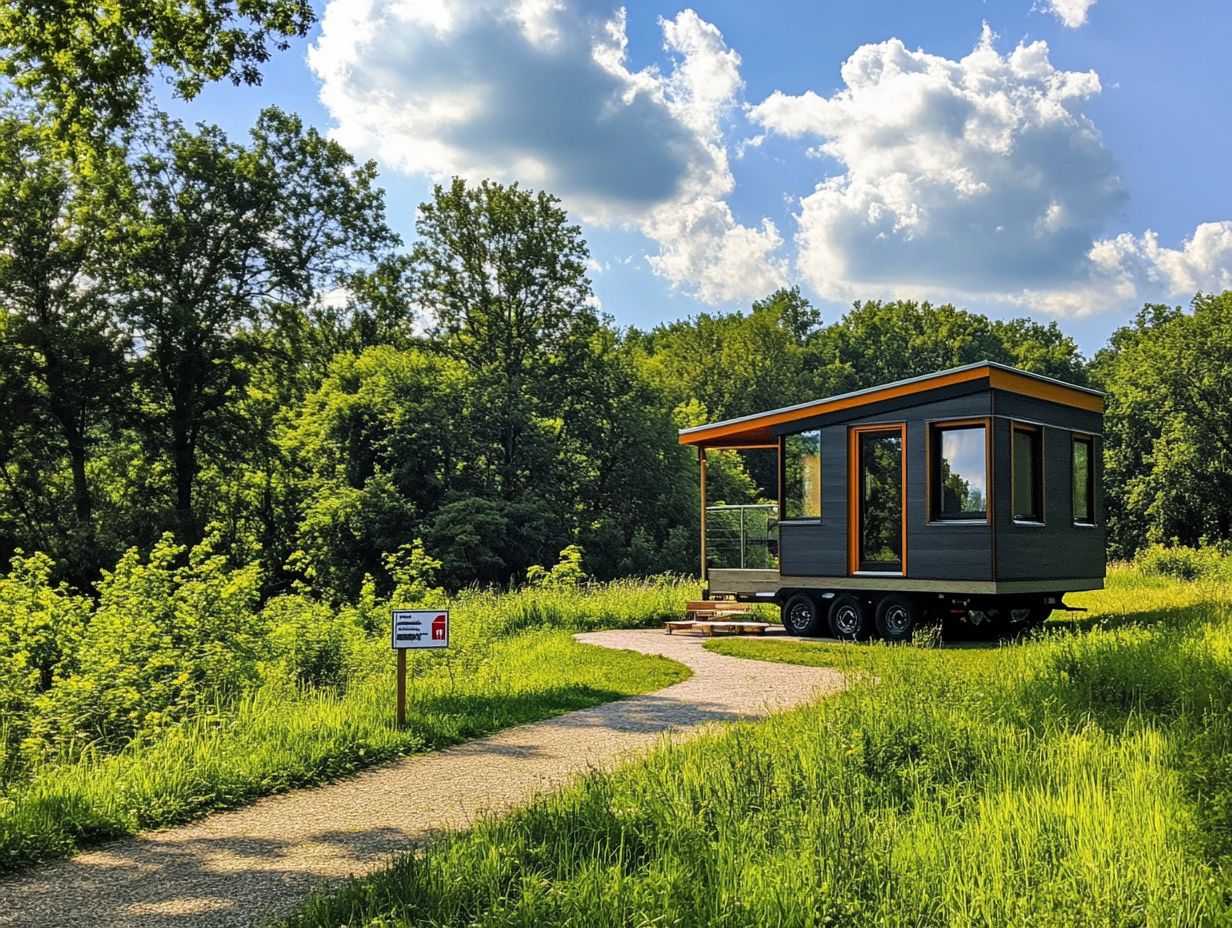
Finding the right place to rent or own land is crucial for tiny house owners. It opens doors to sustainable living in welcoming communities, especially in places like Massachusetts and Great Barrington.
This choice can transform your daily life, affect your financial stability, and shape your sense of community. Renting land often provides flexibility in location and costs, helping you connect with existing tiny house communities like those in the Berkshires. Here, you can find like-minded residents ready to share resources and support each other’s sustainable journeys.
On the other hand, owning land gives you more autonomy. You can customize your living space and establish deeper roots. However, this privilege brings responsibilities, including maintenance tasks and rules about where you can place your tiny house. These are crucial factors to consider when contemplating this lifestyle.
Alternative Parking Options for Tiny Houses
Alternative parking options for tiny houses, such as RV parks and campgrounds, offer unique solutions for those seeking flexibility and community while living in these innovative structures.
Exploring these alternatives allows you to enjoy the benefits of mobility and connect with like-minded individuals who share your passion for this lifestyle.
RV Parks and Campgrounds
RV parks and campgrounds provide excellent parking options for tiny houses. They offer amenities and a sense of community that many find appealing in the tiny house movement.
These locations often come equipped with essential services like water and electricity hookups and waste disposal facilities, making life on the road more convenient. Many parks feature communal spaces such as picnic areas and laundry facilities, along with recreational activities that enhance your living experience.
Being part of a campground community lets you connect with others who share your passion for minimalism and sustainable living. This blend of functionality and camaraderie elevates the tiny house lifestyle, making it both practical and enjoyable.
Living Together: Community and Co-Housing
Community living and co-housing arrangements have become increasingly popular among tiny house enthusiasts. They offer distinctive housing options that promote cooperation and a deep sense of belonging.
In these environments, residents often team up to build communal gardens and tool libraries. This not only boosts sustainability but also strengthens community ties.
Take existing co-housing communities like EcoVillage in Ithaca, NY. They showcase the numerous benefits of this lifestyle. Here, neighbors engage in regular social events and form support networks, creating a robust, interconnected community. This model fosters a profound sense of connection and responsibility among residents, where cooperation truly flourishes.
Frequently Asked Questions
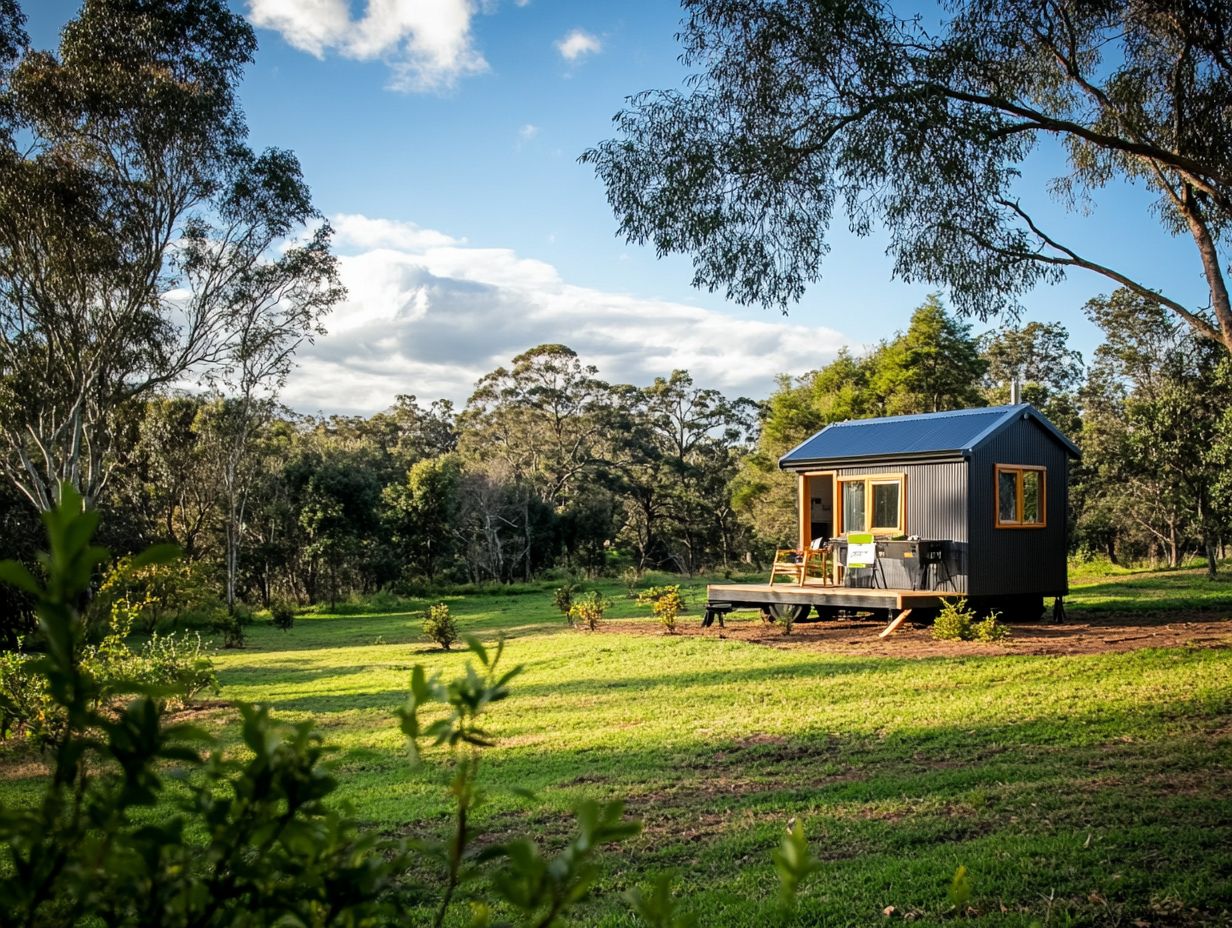
Is it legal to park a tiny house on any property?
No, it is not legal to park a tiny house on just any property. Different states and cities have varying regulations regarding tiny house parking. It is crucial to research and understand these guidelines before parking your tiny house anywhere.
What are the legal guidelines for parking a tiny house on private property?
The legal guidelines for parking a tiny house on private property differ by location. In some areas, a tiny house may be seen as an accessory dwelling unit (ADU) and must meet specific size and zoning requirements. It s best to check with your local government to ensure compliance with all regulations.
Can I park my tiny house on public land?
In most cases, it is not legal to park a tiny house on public land. Public land is typically reserved for public use and cannot be used for private housing.
Some cities designate areas for tiny house communities on public land, so it s important to check your local rules!
What are the legal requirements for parking a tiny house on wheels?
When parking a tiny house on wheels, you must comply with all regulations for travel trailers or RVs.
This may include having a valid RV license, following size and weight restrictions, and obtaining necessary permits. Some areas may also require hookups for water, electricity, and sewage.
Are there any restrictions on where I can park my tiny house?
Yes, there may be restrictions on where you can park your tiny house!
These may include zoning laws, which dictate how land can be used in certain areas, property setbacks, and proximity to other structures.
Research and understand these restrictions before choosing a location to park your tiny house.
What happens if I park my tiny house illegally?
Parking a tiny house illegally can lead to fines and penalties.
Don t risk fines or losing your home! The tiny house may be towed or impounded. It s crucial to follow all legal guidelines and obtain necessary permits.
For more information, be sure to check your local government websites or guidelines!


